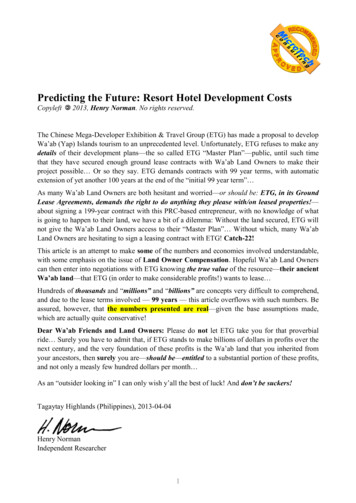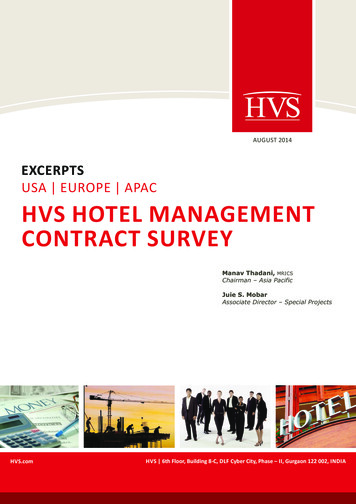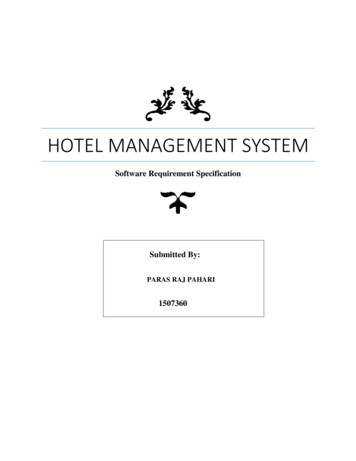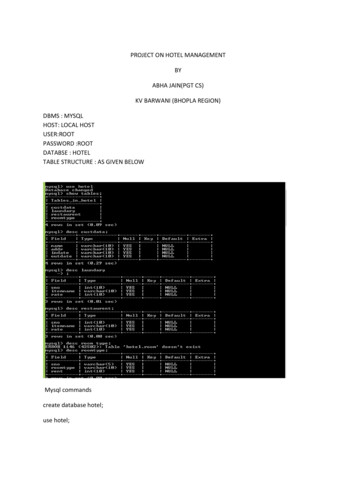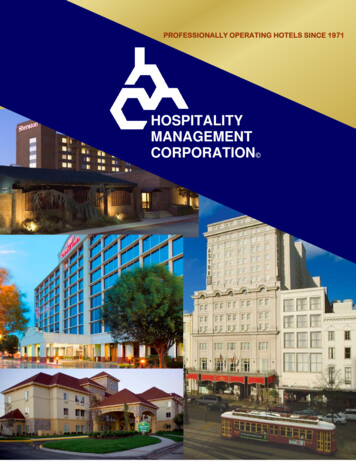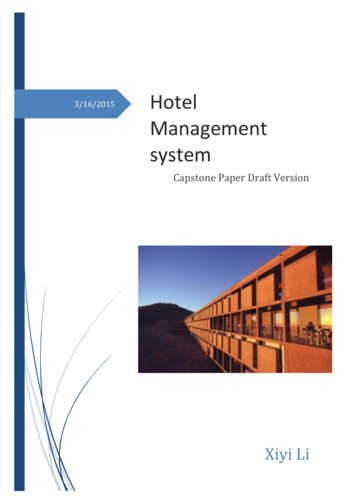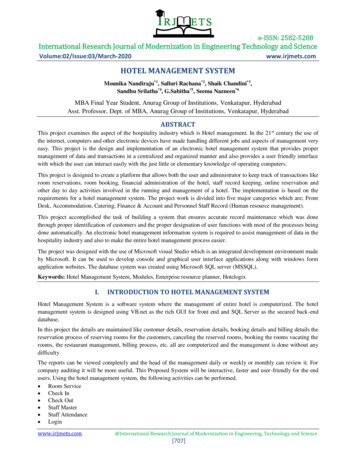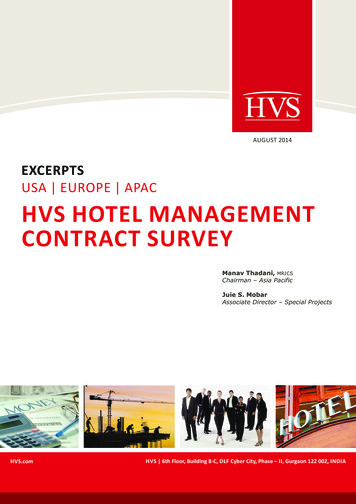
Transcription
AUGUST 2014EXCERPTSUSA EUROPE APACHVS HOTEL MANAGEMENTCONTRACT SURVEYManav Thadani, MRICSChairman – Asia PacificJuie S. MobarAssociate Director – Special ProjectsHVS.comHVS 6th Floor, Building 8-C, DLF Cyber City, Phase – II, Gurgaon 122 002, INDIA
Foreword by Jan A. deRoosWhy does this Survey add to our Understanding of the Hotel Industry?Never has there been a more diverse set of hotel management agreements in use. Management agreements were originally bornof a desire to allow financial or passive owners to participate in the ownership of hotel real estate while contracting withbranded managers to operate the hotel on the owners' behalf. This desire has evolved into a very sophisticated market in whichowners of the real property contract with owners of intellectual capital over the use, branding, and long-term control of hotelassets. It is clear that two fundamental forces drive management contract negotiation: the experience gained from therecent economic stresses applied to the entire industry, and matters specific to a given hotel in a given location. The current andnext generation of contracts must anticipate both forces.Today's hotel owners include real estate investment trusts (REITs), real estate hedge funds, real estate private equity funds,sovereign wealth funds, life insurance companies, pension funds and private wealth clients. Operators include globalcorporations with multiple brands for each market, global single-brand companies, and regional operators (both with andwithout brands). While the relative strengths of the parties have a great influence on contract negotiations, it is notnecessarily the case that the party with the greatest market capitalisation has the greatest power in any given hotel atany given time. With so many potential outcomes, how can one see the “big picture” and understand a contract's strategiclevers?Fortunately, a work like the “HVS Hotel Management Contract Survey” by Manav Thadani and Juie Mobar provides an excellentand invaluable survey that helps us understand the terms and language in contemporary hotel management agreements(HMAs). Theirs is the first survey with a truly global perspective on the structure of management contracts.The authors present and address the unique features of HMAs in a direct and candid way providing owners, investors andlenders with a unique perspective that only comes from hands-on experience in the hotel sector over a long period of time. Thisdepth of knowledge comes from a consulting and advisory team that works solely on hospitality assets. The authors provideinsight into the five principal sections of a management contract: term and renewals, operator management fees, performancetest, budget and expenditures, and termination of the contract by owner.The authors' objective of providing insight into contemporary HMA practice is fully realised in this important work. In addition,by making this available for purchase via the HVS Bookstore, they have committed to educating a broad audience with relevantand current practice. I commend Thadani and Mobar for their excellent and invaluable survey.Jan A. deRoosIthaca, New YorkJuly 28, 2014Jan A. deRoos is the HVS Professor of Hotel Finance and Real Estate at Cornell University's School of Hotel Administration. He is coauthor of The Negotiation and Administration of Hotel Management Contracts, long considered to be the industry's leadingreference on hotel management agreements. The current fourth edition (2009), co-authored with James Eyster, is available at:general books@cornell.edu or (607) 255-2933.PAGE 2 EXCERPTS: USA EUROPE APAC – HVS HOTEL MANAGEMENT CONTRACT SURVEY
HVS Hotel Management Contract Survey (HMCS) is an extensive collation and comparison of key terms andclauses of management contracts across the United States of America, Europe and the Asia Pacific region.While the full report presents the critical survey results in entirety, this document provides an introductionand some excerpts of the survey.Survey MethodologyData Compilation: Data collection for this survey wasimplemented using a combination of different ways. Welooked at contracts from the HVS global database,dispatched an online self-reporting questionnaire, andheld discussions with hotels owners as well asoperators. Eventually, the universal survey sample setcomprised 236 management contracts (57,055rooms); regional breakdown is depicted in Figure 1.Data Analysis: Primary independent variables(defined as inputs or causes) chosen for the dataanalysis are Market Positioning, Room Inventory andAge of the Contract, as highlighted in Figure 2. Here, it isimportant to note that the survey captured informationon additional independent variables (Figure 3), whichhave been discussed in the full report to explain results“only” where applicable.Report Presentation: The full survey report consistsof six major sections, which are recognised to besignificant areas for owner-operator negotiations.Figure 1: Survey Sample SetRegionFigure 4: Survey Sections and Report PresentationContractsTotal Rooms 4,906IManagementContract Term23657,055 Length of the Initial Term Number of Renewals/Extensions Length of the Renewed/Extended Term Provision for Area of Protection/Restricted Area/Non-Compete AreaIIOperator Fees Initiation/Joining/Commitment Fee Technical Services Fee andPre-Opening Fee Base Management Fee Owner's Priority Incentive Management Fee Reservation, Marketing, LoyaltyProgram and Training FeesIIIOperatorPerformanceTest Commencement Year Test Period Type of Test (GOP/RevPAR/Both) Performance Thresholds Provision for Operator to CureIVBudget andExpenditure FF&E Reserve Contribution Control of Receipt/Operating/RevenueAccount Expenditure ThresholdsVContractTerminationby Owner Operator Non-Performance(No Cure Made) Upon Hotel Sale Without Cause Termination Fee Payable to the OperatorVIOthers Operator Key Money Senior HireUniversalPrincipalDiscussionFigure 2: Primary Independent VariablesIndependent VariableParametersMarket PositioningBudgetMid MarketUpscaleUpper UpscaleLuxuryExtended StayRoom InventoryLess than 100 rooms100 - 299 rooms300 - 500 roomsAbove 500 roomsAge of the ContractBefore Year 2005In or After Year 2005Figure 3: Additional Independent VariablesOther VariablesParametersManagementBrand ManagedFranchisedType of PropertyNewExistingYear of Property OpeningBefore Year 2005In or After Year 2005Location of the PropertyBy CityBy CountryKey AreasEXCERPTS: USA EUROPE APAC – HVS HOTEL MANAGEMENT CONTRACT SURVEY PAGE 3
Hotel Companies Represented In This SurveyTotally, 38 branded hotel companies have been represented in this survey, in addition to a few independentoperators and several third-party management companies.Figure 5: Hotel Companies (Branded) Represented in the SurveyAccorAman ResortsAmericas Best Value Inn (Vantage)Banyan Tree Hotels and ResortsBest WesternCaesars EntertainmentCarlson RezidorChoice HotelsClub MéditerranéeConcept HospitalityDusit Hotels and ResortsFairmont Raf es Hotels InternationalFour Seasons Hotels and ResortsFortune Hotels and Resorts (ITC)Hilton WorldwideHyatt Hotels CorporationInterContinental Hotels GroupJumeirah GroupKempinski HotelsLa Quinta Inns and SuitesLouvre HotelsMandarin Oriental Hotel GroupMarriott InternationalMinor Hotel GroupMoevenpick Hotels and ResortsOmni Hotels and ResortsOne&Only Luxury ResortsPeninsula Hotels (HSH Group)Premier Inn (Whitbread)Rosewood Hotels and ResortsSarovar Hotels and ResortsShangri-La Hotels and ResortsSix Senses Hotels, Resorts and SpasStarwood Hotels and ResortsTaj GroupThe Leela Palaces, Hotels and ResortsTrump InternationalWyndham WorldwideReport Purchase And Ordering InstructionsThe full survey report comprising around 35 pages can be purchased for US 2,000. To procure the same, pleaselog on to the HVS Bookstore. The report will be available both in PDF (soft copy) as well as in print (hard copy).The purchaser will be allowed to choose the preferred format, post which a personalised copy of the report willbe sent across.For ordering instructions or any other assistance, please contact:Juie S. MobarAssociate Director – Special ProjectsHVSEmail: jmobar@hvs.comData confidentiality has been strictly maintained throughout this survey, with results in the report beingpresented only in aggregate and no individual contract details being revealed.PAGE 4 USA EUROPE APAC – HVS HOTEL MANAGEMENT CONTRACT SURVEY
EXCERPT IFigure 6: Length Of The Initial TermUniversal Sample SetLength of the Initial TermAvg. 18.3 years3%The initial term of a management contract for anew/proposed hotel typically commences from theEffective Date (date of execution of the managementagreement) and continues until the expiration of a“specified” number of years after the Opening Date. Inthe case of existing hotels, the initial term is generallycalculated from the Effective Date until the expiration ofa “specified” number of years. The average length ofthe initial term for the universal sample set is 18.3years.It is common understanding that operators prefer alonger contract term with automatic renewal options(or those excercisable by the operator) citing the needfor stability, to protect their brand image as well as toobtain the desired return on their investment. On theother hand, owners prefer a shorter initial term withmultiple renewal options on mutual consent, seekingflexibility. In addition to which side of the table youare on, the length of the initial term is alsodependent on the region of operation (Figure 6),hotel’s market positioning, room inventory and theyear of signing the contract, among others.The average length of the initial term for existinghotels (50% of the universal sample set) is found to be17.7 years vis-a-vis new properties (48% of theuniversal sample set) that have a longer average term of19.1 years. This data is particularly important whenone considers the survey results by region in Figure 6.USA, a matured hotel market with 73% of the sub-setbeing represented by existing hotels, has contracts witha shorter initial term than those in the APAC region,which is a developing/emerging hotel market with74% of the sub-set corresponding to new hotels.Additionally, it has been observed that in recent times,increased competition owing to more number ofplayers in developing/emerging hotel markets, besidesthe rising awareness amongst hotel owners, haveresulted in management contracts with a shorter initialterm (safeguarding the interest of both parties shoulddisappointing market conditions occur).The full survey report provides details on the length of theinitial term by hotel market positioning, room inventoryand year of signing the contract, besides elaborating onrenewal/extensions and area of protection/restrictedarea/non-compete area.15%10%Less than 10 years18%11%10 years15 years16%27%20 years25 years30 yearsMore than 30 yearsUSA Sub-SetAvg. 15.6 years2%9%9%25%Less than 10 years10 years15 years28%20%20 years25 years7%30 yearsMore than 30 yearsEurope Sub-SetAvg. 21.1 years1% 2%1%Less than 10 years11%26%10 years21%15 years20 years12%25 years26%30 yearsMore than 30 yearsNot AvailableAPAC Sub-SetAvg. 18 .3 years4% 4%10%12%Less than 10 years24%10 years15 years20 years26%20%25 years30 yearsMore than 30 yearsRegion: In USA, the operators appear more comfortable with ashorter initial term, with 25% of the contracts offering lessthan 10 years. However, in case of APAC, relatively a developinghotel market, this carve is only 4%. Also, an initial term of 20years is most common across all regions.Note: 87% of the Europe sub-set comprises contracts forupscale/upper upscale/luxury hotels, which could be thereason behind fewer contracts offering a shorter initial term.EXCERPTS: USA EUROPE APAC – HVS HOTEL MANAGEMENT CONTRACT SURVEY PAGE 5
EXCERPT IIFigure 7: Base Management Fee By Room Inventory5.00%Base Fee and Incentive Fee together make up theManagement Fees charged by the operator in exchangefor performing the duties specified in the contract.4.00%Base Management Fee: The base fee is usuallycalculated as a percentage of the hotel’s GrossOperating Revenue. It could either be a single fee, or asum of licensing/royalty fee and operating fee.Moreover, the base fee is generally chargeablethroughout the life of the contract; however, it could beeither computed as a “constant” percentage across allyears, or it could rise over the initial years, graduallystabilising for the remainder term of the contract. Thescaled up average base fee for the universal sampleset is 2.65% (Year 6 onwards).1.00%3.00%0.00%2.76%Less than 100rooms100 - 299rooms2.42%2.30%300 - 500roomsAbove 500roomsUSA 0%1.00%0.00%Less than 100rooms100 - 299rooms300 - 500roomsAbove 500roomsEurope 4%1.00%0.00%The full survey report features exhaustive information onthe Base Fee highlighting how it varies by marketpositioning, room inventory and age of the contract, inaddition to relevant details on the other operator fees.However, exceptions to linking this fee to GOP/AGOPcan depend on the owner-operator negotiations andasset-specific considerations.2.64%2.00%Figure 7 discusses the survey results pertaining to thisfee by room inventory. The following information mustbe borne in mind while reviewing this figure – (i) 24%of the European contracts do not provide completedetails on the base fee, lowering the average, as we donot have the Licensing/Royalty agreements for these;(ii) 10% of the APAC contracts do not charge base feeseparately. They instead charge a higher incentivemanagement fee, which is inclusive of the base fee; and(iii) overall, the base fee for existing hotels (2.86%) isfound to be higher than that for new hotels (2.42%).Incentive Management Fee: In addition to the basefee, an operator usually receives an incentive fee, whichis linked to the hotel’s operating profit. Therefore, whilethe former motivates the operator to focus on the topline, the latter ensures that there is an incentivetowards controlling expenses as well. Most operatorsprefer linking this fee to either the Gross OperatingProfit (GOP) or the Adjusted GOP (AGOP, which isinclusive of the base fee and also known as IncomeBefore Fixed Charges). Expenses beyond this level in aP&L (up to the EBIDTA line item per the UniformSystem of Accounts for the Lodging Industry), are FixedCosts pertaining to Rent, Property Insurance, PropertyTax and Reserve for Replacement, which are arguablybeyond the control of the Operator.Universal Sample Set6.00%Management FeesLess than 100rooms100 - 299rooms300 - 500roomsAbove 500roomsAPAC Sub-Set6.00%5.00%4.00%3.00%2.20%2.42%Less than 100rooms100 - 299rooms2.00%1.81%2.00%300 - 500roomsAbove 500rooms1.00%0.00%Room Inventory: It is important to correlate the data in thisfigure with hotel market positioning. The 100 rooms group inthe USA sub-set is mostly (90%) represented by budget/midmarket hotels that tend to have a higher base fee thanupscale/luxury hotels. The situation is reversed in the case ofthe Europe sub-set with this inventory group corresponding toonly upscale/upper upscale/luxury hotels. As for the APACcontracts, they together represent a near equal mix of lowerand higher ranges of positioning.On the other hand, 95% of the 500 rooms group for theuniversal sample set relates to upscale/luxury hotels.PAGE 6 USA EUROPE APAC – HVS HOTEL MANAGEMENT CONTRACT SURVEY
In this survey, contracts are seen having differentincentive fee structures. Broadly, these can beidentified as under: Flat Fee Structure: Incentive fee is expressed as apercentage of the annual operating profit (defineddifferently across contracts). This percentage couldeither remain constant or could scale upwardsthrough the term of the contract – lower in the initialyears and peaking from Year 5 or 6 onwards. Forexample, Operating Years 1-4 could have anincentive fee of 6%, and for the remainder of the termit could equal 8%. Linked to the GOP/AGOP performance of theHotel: Incentive fee is defined as a percentage of theannual operating profit (defined differently acrosscontracts), with it being dependent on the predefined ranges of GOP/AGOP Margin. For example,incentive fee could equal 8% of GOP/AGOP, if thehotel achieves a GOP/AGOP Margin between 35%40%; and it could equal 10% of GOP/AGOP for aMargin 40%. Linked to Available Cash Flow of the Hotel: Whereapplicable, Incentive Fee is typically subordinated tothe Owner’s Priority (most contracts in this surveyoffering this type of incentive fee structure alsoprovide for an owner’s priority), with “Available CashFlow” being defined differently in each contract. Others: This type is represented by contracts thateither have a combination of Flat and Linked Feestructures or present a very customised calculationof the incentive fee. For example, incentive fee couldequal 2% of Gross Revenues or 20% of the AvailableCash Flow, whichever is the lesser of the two.Figure 8 depicts the types of incentive fee structuresprevailing in the universal and regional sample sets.Figure 8: Types Of Incentive Fee StructuresUniversal Sample Set17%Linked to GOP Performance16%7%7%25%Linked to AGOP PerformanceLinked to Available Cash FlowOthersNo Incen ve Fee/No DetailsUSA Sub-Set10%26%Flat FeeLinked to Available Cash Flow8%56%OthersNo Incen ve Fee/No DetailsEurope Sub-Set20%Flat Fee30%Linked to GOP Performance3%8%25%14%Linked to AGOP PerformanceLinked to Available Cash FlowOthersNo Incen ve Fee/No DetailsAPAC Sub-Set16%Flat Fee6%45%3%Linked to GOP PerformanceLinked to AGOP Performance13%The full survey report provides comprehensive data onowner's priority in addition to discussing the incentivefee ranges across the three different fee structures.Flat Fee28%Linked to Available Cash Flow17%OthersNo Incen ve Fee/No DetailsIncentive Fee Structure: Notably, the flat fee structure alongwith linking the incentive fee to GOP/AGOP Margin are mostprevalent in the APAC region, while it is more customary in USAto link the incentive fee to the hotel's available cash flow.Considering that the provision for an owner's priority is new tothe APAC region, it is not surprising that the only two contractsin the subject sub-set offering an incentive fee linked to thehotel's available cash flow were signed as recently as in 2012.European contracts, in contrast, have the maximumcustomised calculations for incentive fee among the threeregions.EXCERPTS: USA EUROPE APAC – HVS HOTEL MANAGEMENT CONTRACT SURVEY PAGE 7
About HVSAbout the AuthorsHVS is the world's leading consulting and services organisationfocused on the hotel, mixed-use, shared ownership, gaming, andleisure industries. Established in 1980, the company performs 4500 assignments each year for hotel and real estate owners, operators,and developers worldwide. HVS principals are regarded as theleading experts in their respective regions of the globe. Through anetwork of more than 30 offices and 450 professionals, HVS providesan unparalleled range of complementary services for the hospitalityindustry. HVS.comManav Thadani, MRICS,Chairman, Asia Pacific, HVSfounded the New Delhioffice in 1997. He is activelyinvolved in operatorsearch/managementcontract negotiations andprovides strategic advice to key clients. Headditionally serves as a mentor to otherHVS verticals in the APAC region, and is theglobal head of HVS Sustainability.Moreover, Manav oversees the planningand implementation of the regional HVSconferences, including Hotel InvestmentConference – South Asia (HICSA); Tourism,Hotel Investment & NetworkingConference (THINC) Indonesia; and theChina Hotel Investment Conference(CHIC). On a personal level, Manav cofounded SAMHI in 2011, a leading Indianhotel investment and development firmwith focus on ownership of branded hotelsin the mid-scale/economy segmentsacross key cities.mthadani@hvs.comSuperior Results through Unrivalled Hospitality Intelligence.Everywhere.HVS Consulting & Valuation enjoys impeccable worldwidereputation for credibility, excellence and thoroughness. With officesstrategically located throughout North and South America, Asia,Europe and the Middle East, our clients benefit from local insightsand international expertise.HVS.comJuie S. Mobar is AssociateDirector - Special Projectswith HVS' New Delhi office.She has spent five years withthe company starting as aConsulting & ValuationAnalyst . In addition tohaving worked on feasibility studies,valuations, market studies andoperational audits in the past, Juie hasbeen actively involved in operator searchand management contract negotiations,research-based assignments and selectw o r k f o r H V S S u s t a i n a b i l i t y. S h ecompleted her Management TraineeProgram with the Taj Group in 2006, andholds a BA (Hon) in Hotel Managementfrom the Institute of Hotel ManagementAurangabad (University of Huddersfield,UK) and Bachelors in BusinessA d m i n i s t ra t i o n f ro m M a ra t hwa d aUniversity.jmobar@hvs.comHVS 6th Floor, Building 8-C, DLF Cyber City, Phase – II, Gurgaon 122 002, INDIA
HVS.com HVS 6th Floor, Building 8-C, DLF Cyber City, Phase - II, Gurgaon 122 002, INDIA HVS HOTEL MANAGEMENT CONTRACT SURVEY Manav Thadani, MRICS Chairman - Asia Pacific
